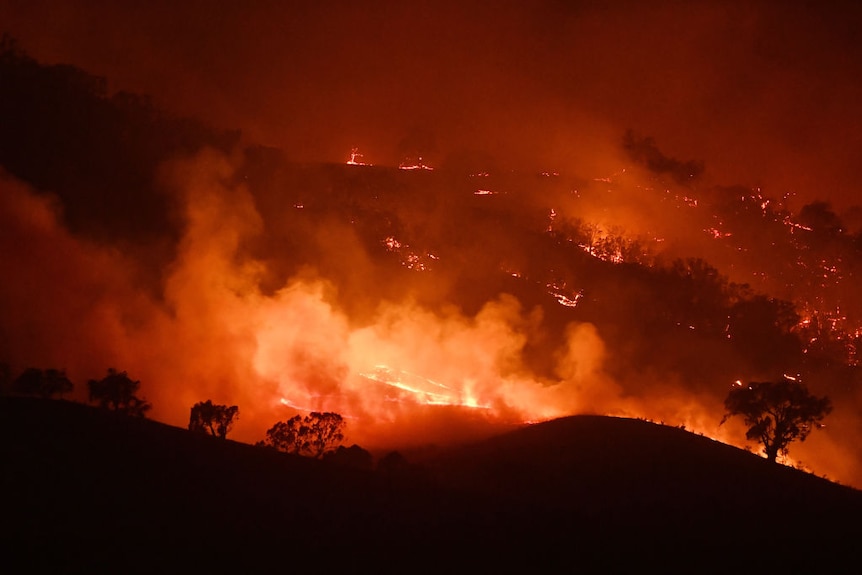The NSW auditor-general has warned the Rural Fire Service (RFS) is not gathering the necessary data to improve its response to bushfires and it lacks an overarching strategy behind the deployment of resources.
Key points:
- The auditor-general says there is no overarching strategy behind the allocation of RFS firefighting resources in NSW
- The audit reviewed the allocation and maintenance of bushfire equipment between 2017 and 2022
- It found the RFS was allocating resources based on “historical fleet sizes” not in preperation for future fire conditions fuelled by climate change
NSW auditor-general Margaret Crawford today published an audit of the planning and management of the state’s bushfire equipment between 2017 and 2022.
Ms Crawford said with changes to the climate forecast to make extreme weather more frequent and intense, it was important authorities understood bushfire risks and had a fit-for-purpose firefighting fleet.
She indicated, however, that the RFS had not been collecting the necessary data to improve its response to future bushfires.
“The RFS has not conducted future-focused fleet research or planning into technologies that match fleet capabilities to emerging or future fire risks,” Ms Crawford said.
“Since the significant fire events of 2019–2020, the RFS has not changed its approach to planning for, or assessing, the operational capabilities of the fleet.”
The audit found the absence of this data made it impossible to determine whether resources were being distributed appropriately.
“The RFS does not measure the time it takes for brigades to reach fires or assess the number and size of fires in each of its 44 NSW Rural Fire Districts,” Ms Crawford said.
“Without metrics of fire activity, or assessments of brigade performance against set measurements and targets, it is not possible to determine whether the current RFS fleet size and composition is appropriate to meet fire activity and risks in different NSW regions.”
The RFS advised the auditor-general that it was in the process of developing a program that would involve resources being deployed to regions based on their risk profile.
But Ms Crawford said currently resources were deployed based on factors such as “historical fleet sizes”, not the current and future demand for resources.
“Decisions about the fleet are ultimately made by senior managers at RFS Headquarters but there is no framework to explain how the fleet decisions are made or how the RFS assures itself that its fleet is fit-for-purpose in a changing climatic environment,” she said.
Confusion between council and RFS
The RFS is the lead combat agency for bushfires in NSW, however the majority of its firefighting fleet is owned by local councils.
The report found that 63 per cent of service agreements between the RFS and councils had not been updated in the last ten years, and the fleet management system was described as “time consuming” and “inefficient”.
Ms Crawford said this arrangement created confusion about who is responsible for the maintenance and management of resources.
“The lack of cohesion in roles and responsibilities for managing rural firefighting vehicles increases the risk that these firefighting assets are not properly maintained and managed, and introduces a risk that this could affect their readiness to be mobilised when needed,” she said.
Ms Crawford recommended the RFS develop a fleet enhancement framework informed by an assessment of current fleet capabilities that could meet the future fire risks across the state.
Funding falls short
The auditor-general also revealed the NSW government funding had failed to match the cost of replacing the state’s ageing firefighting fleet.
In 2019 the RFS asked the NSW government for an increase to its baseline funding with 424 assets beyond their service life and 1908 assets due for replacement within the next decade.
The total funding for the fleet renewal was estimated at $554.9 million.
The RFS sought an extra $404.5 million over eight years to implement the recommendations of the NSW Bushfire Inquiry to improve fire truck safety.
As of June 2022, the state government had provided the RFS just $150.3 million towards new firefighting assets.
In response to the audit, the RFS said while it did not agree with the manner in which the review arrived at its findings, it does agree with its recommendations and is working in a range of improvements to its service.
“The service has commenced a considerable body of work to drive improvements in the safety, delivery, rejuvenation and operation of its fleet, including the development of a Resource to Risk fleet management model, the Next Generation Fleet priority project to design the fire fighting appliances of the future and suite of research and development.”
Find more local news
Browse for your location and find more local ABC News and information
